#Catholic saint
Text

Saint George
Died: 303
Feast Day: April 23
Patronage: England, crusaders, soldiers
Saint George was a Roman soldier of Greek Christian origin. He was a Praetorian guard for Diocletian who valued his service. When the Emperor ordered the soldiers to sacrifice to the gods, St. George refused, even after Diocletian offered him land, money, and slaves. George was then tortured and decapitated. He is one of the 14 Holy Helpers and a prominent military patron often depicted fighting a dragon used to represent the devil. Today he’s known and revered by both Christians and Muslims.
Prints, plaques & holy cards available for purchase here: (website)
87 notes
·
View notes
Text

St Catherine of Siena, by Jennifer Beam
#christianity#faith#st catherine of siena#saints#catholic saints#catholicism#theology#christian#catholic#spirituality#bible verse#religion#Catholic saint#catholic art#Christian art
287 notes
·
View notes
Text

My patron and confirmation Saint, Dymphna! I as she is the patron of mental health, I would share her prayer for intercession of mental issues:
"𝐆𝐨𝐨𝐝 𝐒𝐚𝐢𝐧𝐭 𝐃𝐲𝐦𝐩𝐡𝐧𝐚, 𝐠𝐫𝐞𝐚𝐭 𝐰𝐨𝐧𝐝𝐞𝐫-𝐰𝐨𝐫𝐤𝐞𝐫 𝐢𝐧 𝐞𝐯𝐞𝐫𝐲 𝐚𝐟𝐟𝐥𝐢𝐜𝐭𝐢𝐨𝐧 𝐨𝐟 𝐦𝐢𝐧𝐝 𝐚𝐧𝐝 𝐛𝐨𝐝𝐲, 𝐈 𝐡𝐮𝐦𝐛𝐥𝐲 𝐢𝐦𝐩𝐥𝐨𝐫𝐞 𝐲𝐨𝐮𝐫 𝐩𝐨𝐰𝐞𝐫𝐟𝐮𝐥 𝐢𝐧𝐭𝐞𝐫𝐜𝐞𝐬𝐬𝐢𝐨𝐧 𝐰𝐢𝐭𝐡 𝐉𝐞𝐬𝐮𝐬 𝐭𝐡𝐫𝐨𝐮𝐠𝐡 𝐌𝐚𝐫𝐲, 𝐭𝐡𝐞 𝐇𝐞𝐚𝐥𝐭𝐡 𝐨𝐟 𝐭𝐡𝐞 𝐒𝐢𝐜𝐤, 𝐢𝐧 𝐦𝐲 𝐩𝐫𝐞𝐬𝐞𝐧𝐭 𝐧𝐞𝐞𝐝. (𝐌𝐞𝐧𝐭𝐢𝐨𝐧 𝐢𝐭.) 𝐒𝐚𝐢𝐧𝐭 𝐃𝐲𝐦𝐩𝐡𝐧𝐚, 𝐦𝐚𝐫𝐭𝐲𝐫 𝐨𝐟 𝐩𝐮𝐫𝐢𝐭𝐲, 𝐩𝐚𝐭𝐫𝐨𝐧𝐞𝐬𝐬 𝐨𝐟 𝐭𝐡𝐨𝐬𝐞 𝐰𝐡𝐨 𝐬𝐮𝐟𝐟𝐞𝐫 𝐰𝐢𝐭𝐡 𝐧𝐞𝐫𝐯𝐨𝐮𝐬 𝐚𝐧𝐝 𝐦𝐞𝐧𝐭𝐚𝐥 𝐚𝐟𝐟𝐥𝐢𝐜𝐭𝐢𝐨𝐧𝐬, 𝐛𝐞𝐥𝐨𝐯𝐞𝐝 𝐜𝐡𝐢𝐥𝐝 𝐨𝐟 𝐉𝐞𝐬𝐮𝐬 𝐚𝐧𝐝 𝐌𝐚𝐫𝐲, 𝐩𝐫𝐚𝐲 𝐭𝐨 𝐓𝐡𝐞𝐦 𝐟𝐨𝐫 𝐦𝐞 𝐚𝐧𝐝 𝐨𝐛𝐭𝐚𝐢𝐧 𝐦𝐲 𝐫𝐞𝐪𝐮𝐞𝐬𝐭. (𝐏𝐫𝐚𝐲 𝐨𝐧𝐞 𝐎𝐮𝐫 𝐅𝐚𝐭𝐡𝐞𝐫, 𝐨𝐧𝐞 𝐇𝐚𝐢𝐥 𝐌𝐚𝐫𝐲 𝐚𝐧𝐝 𝐨𝐧𝐞 𝐆𝐥𝐨𝐫𝐲 𝐁𝐞.) 𝐒𝐚𝐢𝐧𝐭 𝐃𝐲𝐦𝐩𝐡𝐧𝐚, 𝐕𝐢𝐫𝐠𝐢𝐧 𝐚𝐧𝐝 𝐌𝐚𝐫𝐭𝐲𝐫, 𝐩𝐫𝐚𝐲 𝐟𝐨𝐫 𝐮𝐬."
(taken from Catholic Prayers.com)
Saint Dymphna, pray for us!
71 notes
·
View notes
Text
NEW SAINT NEW SAINT NEW SAINT
28 notes
·
View notes
Text
✨CUSTOM ORDER✨
Emerald St. Brigid Rosary

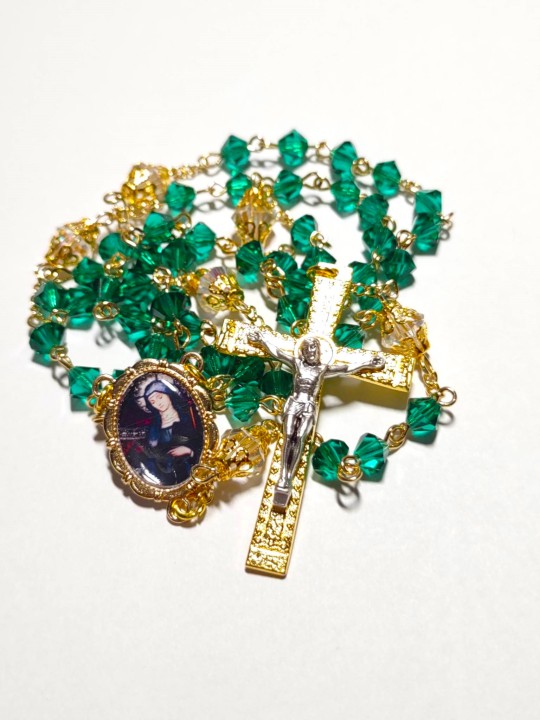

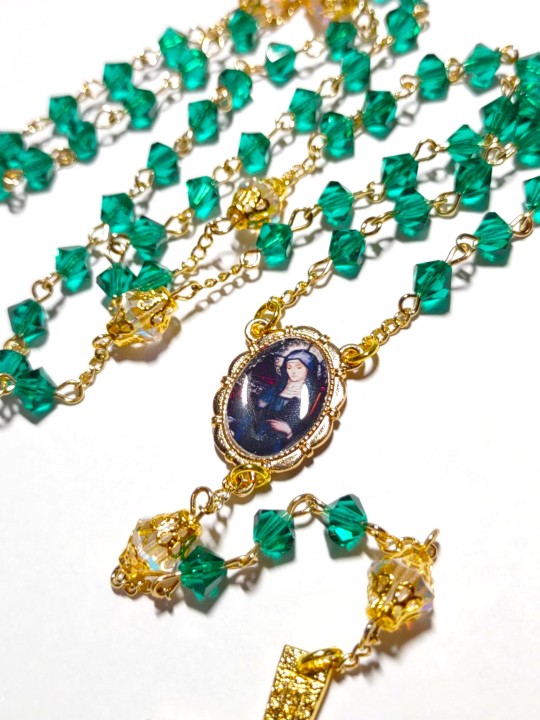
#st brigid#saints#catholic#christian#catholic saint#emerald#green#jesus#mary#irish saints#rosary#hndmdbystephanie#etsy
28 notes
·
View notes
Text
Saint Hippolytus of Rome
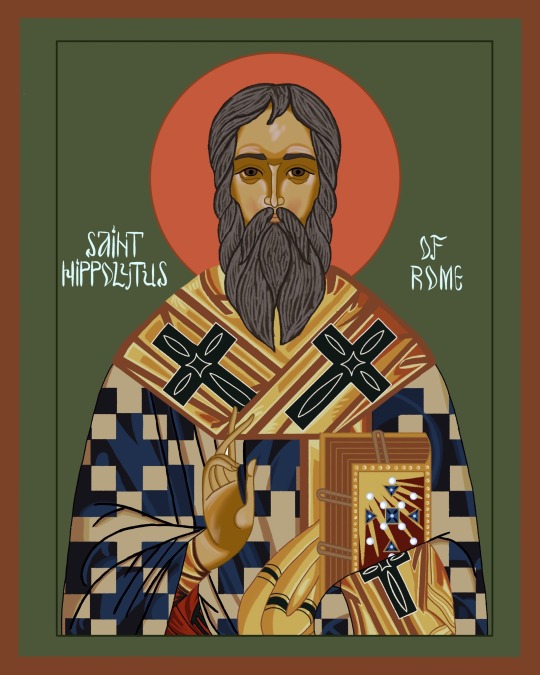
The hieromartyr Hippolytus of Rome was a priest and an ecclesiastical writer of the third century. He is considered to have been antipope of the Church of Rome from about 217 to 235. He was among the most important Christian theologians of the third century, and a saint. His feast day is January 30.
T
Life
The early life of Hippolytus is unknown. He was born about the year 170 and lived in Rome when young. Greek was his native tongue. He is believed to have been a disciple of Irenaeus of Lyons and to have met Origen. From the details of his work, Philosophoumena Hippolytus apparently was in Rome during the time Victor was the bishop of Rome. At the beginning of the third century he was a priest noted for his learning, eloquence, zeal, and moral earnestness. He was also noted to be a bishop of an unspecified city by Eusebius of Caesarea and Jerome and by the poet Prudentius as bishop of Portus, a port for Rome.
The Philosophoumena, that is a part of his larger work "Refutation of All Heresies", shows that he dissented from the compassionate views of Bps. Zephyrinus, whom he considered to be a weak man "unskilled the church's rule", and Callistus I of Rome concerning the reception of backsliders and heretics who had repented. In the "Refutation of All Heresies" Hippolytus set out to refute the doctrines of the Gnostics and condemn heretics by showing that their views were taken from pagan philosophy and oriental theosophy.
Hippolytus also came into conflict with the opinions of the bishops of Rome on christological issues of the day to such an extant that came to allow himself to be elected a rival bishop of Rome, the first antipope
Under the persecutions of emperor Maximinus Thrax Hippolytus was exiled to Sardinia in 235 where he died, reportedly a martyr. His body was returned to Rome and interred in a cemetery on the Via Tiburtina. By about 255, he was considered a martyred priest by the Church, indicating that he had been reconciled with the Church and not considered a schismatic.
Taken from Orthodox Wiki
#eastern orthodox#orthodox#byzantine#orthodoxy#eastern catholic#christianity#icon#iconography#byzantine icon#christian iconography#Hippolytus Of Rome#St. Hippolytus of Rome#Saint Hippolytus of Rome#Catholic Saint#Orthodox Saint#Greek Orthodox#Russian Orthodox#Roman Catholic#Catholic Icon#Church Father#Eastern Orthodox Church#Russian orthodox icon#great saint#Orthodox Church#early church#patristic#Hippolytus#Orthodox iconography#Eastern orthodox icon#Eastern Orthodox iconography
9 notes
·
View notes
Text
Saint Peter: Cephas

5 notes
·
View notes
Text

The talented nuns of Ennetach decorated the ribcage of Saint Felix in Aulendorf. © 2013 Paul Koudounaris.
#ennetach#nuns#ribcage#saint felix#aulendorf#jewels#© 2013 Paul Koudounaris#bejeweled skeleton#catholic martyr#catholic saint#religion
1 note
·
View note
Photo
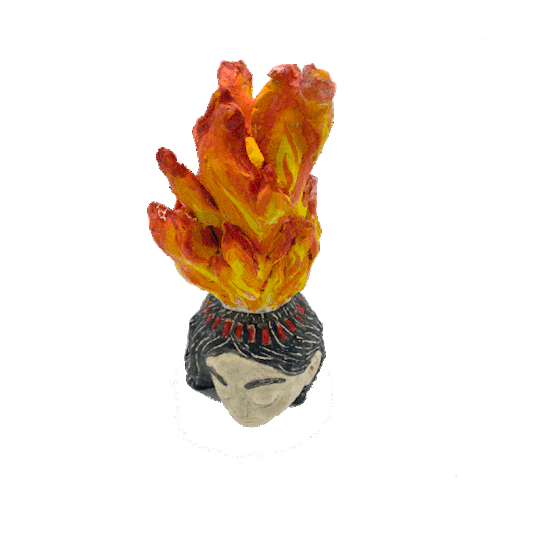

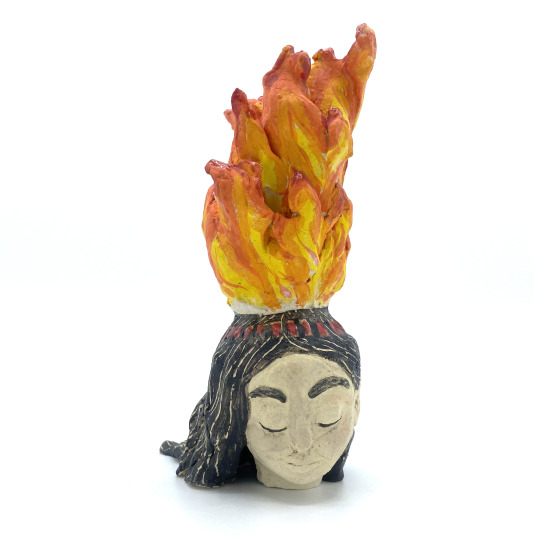
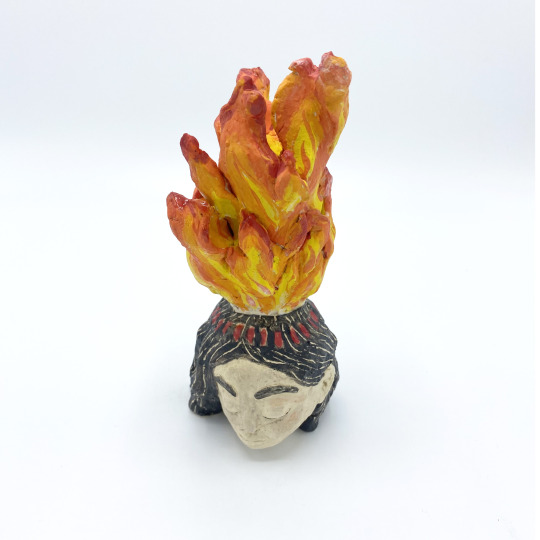

La Santa, a small sculpture
2022, earthenware, glazes
Roxane Wing
10 notes
·
View notes
Text

#catholicism#roman catholic#catholic church#catholic#st. jerome#patron saint#catholic saint#doctor of the church#lion#book#writing#pray for us
12 notes
·
View notes
Photo

Statue of Saint Barbara, Polychrome limestone, circa 1550, at Saint-Jean-au-Marché in Troyes, France
In the Christian myth of St. Barbara, Dioscorus, a wealthy pagan, keeps his daughter Barbara in a tower. While he is away, she has workmen add a third window to the tower in honor of the Trinity. When he returns, he flies into a rage, pursues Barbara into the hills, captures her, and sends for a judge. She refuses to recant, so the judge orders various tortures and finally has Dioscorus behead her. He does and is thereupon consumed by a fire from Heaven.
This myth emerged in the 15th century and was frequently depicted in art until the Council of Trent, held between 1545 and 1563, cracked down on “heresies” and any other challenges to the Roman Catholic church’s authority as the voice of absolute truth.
Virgin-martyr stories like St. Barbara’s are inherently anti-authoritarian. Young women taking a stand against constituted authorities and often against their families was not something they wanted to encourage. Images of St. Barbara tapered off drastically and were replaced by examples of dutiful daughters who respected their families and other authorities.
Photo by Charles Reeza
#Catholic saint#rebellious woman#No new windows without daddy's consent!#church propaganda#medieval art#stone carving#sculpture
18 notes
·
View notes
Text

St. Dismas
Feast day: March 25
Patronage: repentant thieves, prisoners, undertakers
Saint Dismas was the good thief crucified with Jesus on Calvary. This is what St. Luke writes about him: 39 And one of those robbers who was hanged blasphemed him, saying: If thou be Christ, save thyself and us. 40 But the other answering, rebuked him, saying: Neither dost thou fear God, seeing; thou art under the same condemnation? 41 And we indeed justly: for we receive the due reward of our deeds. But this man hath done no evil. 42 And he said to Jesus: Lord, remember me when thou shalt come into thy kingdom. 43 And Jesus said to him: Amen I say to thee: This day thou shalt be with me in paradise. Luke 23:39-43
Prints, plaques & holy cards available for purchase here: (website)
139 notes
·
View notes
Text
Prayer to St. Mary Magdalene and Our Lord
(by St. Anselm)
St. Mary Magdalene, thou didst come with springing tears to the spring of mercy, Christ; from Him thy burning thirst was abundantly refreshed, through Him thy sins were forgiven; by Him thy bitter sorrow was consoled.
My dearest lady, well thou knowest by thine own life how a sinful soul can be reconciled with its creator, what counsel a soul in misery needs, what medicine will restore the sick to health.
It is enough for us to understand, dear friend of God, to whom were many sins forgiven, because she loved much.
Most blessed lady, I who am the most evil and sinful of men do not recall thy sins as a reproach, but call upon the boundless mercy by which they were blotted out.
This is my reassurance, so that I do not despair; this is my longing, so that I shall not perish.
I say this of myself, miserably cast down into the depths of vice, bowed down with the weight of crimes, thrust down by my own hand into a dark prison of sins, wrapped round with the shadows of darkness.
Therefore, since thou art now with the chosen because thou art beloved and are beloved because thou art chosen of God, I, in my misery, pray to thee in bliss; in my darkness, I ask for light; in my sins, redemption; impure, I ask for purity.
Recall in loving kindness what thou used to be, how much thou didst need mercy, and seek for me that same forgiving love that thou didst receive when thou wert wanting it. Ask urgently that I may have the love that pierces the heart; tears that are humble; desire for the homeland of Heaven; impatience with this earthly exile; searing repentance; and a dread of torments in eternity.
Turn to my good that ready access that thou once didst have and still doth have to the spring of mercy.
Draw me to Him where I may wash away my sins; bring me to Him Who can slake my thirst; pour over me those waters that will make my dry places fresh. Thou wilt not find it hard to gain all thou doth desire from so loving and so kind a Lord, Who is alive and reigns and is thy friend.
For who can tell, beloved and blest of God, with what kind familiarity and familiar kindness He Himself didst reply on thy behalf to the calumnies of those who were against thee? How He didst defend thee, when the proud Pharisee was indignant, how He didst excuse thee, when thy sister didst complain, how highly He didst praise thy deed, when Judas didst begrudge it.
And, more than all this, what can I say, how can I find words to tell, about the burning love with which thou didst seek Him, weeping at the sepulchre, and wept for Him in thy seeking?
How He cameth, who can say how or with what kindness, to comfort thee, and madest thee burn with love still more; how He didst hide from thee when thou didst want to see Him, and showed Himself when thou didst not think to see Him; how He was there all the time thou didst seek Him, and how He didst seek thee when, seeking Him, thou didst weep.
But Thou, most holy Lord, why didst Thou ask her why she weeps?
Surely Thou canst see her heart, the dear life of her soul, is cruelly slain.
O love to be wondered at;
O evil to be shuddered at;
Thou didst hang on the wood, pierced by iron nails, stretched out like a thief for the mockery of wicked men; and yet, 'Woman,' Thou didst say, 'why art thou weeping?' She had not been able to prevent them from killing Thee, but at least she longed to keep Thy Body for a while with ointments lest it decay.
No longer able to speak with Thee living, at least she could mourn for Thee dead. So, near to death and hating her own life, she repeats in broken tones the words of life which she had heard from the living.
And now, besides all this, even the Body which she was glad, in a way, to have kept, she believes to have gone.
And can Thou asketh her, 'Woman, why art thou weeping?'
Had she not reason to weep?
For she had seen with her own eyes---if she could bear to look---what cruel men cruelly did to Thee; and now all that was left of Thee from their hands she thinks she has lost.
All hope of Thee has fled, for now she has not even Thy lifeless Body to remind her of Thee.
And someone asks, 'Who art thou looking for? Why art thou weeping?'
Thou, her sole joy, should be the last thus to increase her sorrow. But Thou knowest it all well, and thus Thou didst wish it to be, for only in such broken words and sighs can she convey a cause of grief as great as hers. The love Thou hast inspired Thou didst not ignore.
And indeed Thou knowest her well, the gardener, Who planted her soul in His garden. What Thou plantest, I think Thou doth also water.
Does Thou water, I wonder, or does Thou test her?
In fact, Thou art both watering and putting to the test.
But now, good Lord, gentle Master, look upon Thy faithful servant and disciple, so lately redeemed by Thy Blood, and see how she burneth with anxiety, desiring Thee, searching all round, questioning, and what she longest for is nowhere found.
Nothing she seest canst satisfy her, since Thou Whom alone she wouldst behold, she seest not.
What then?
How long will my Lord leave His beloved to suffer thus?
Have Thou put off compassion now Thou hast put on incorruption? Did Thou let go of goodness when Thou didst lay hold of immortality?
Let it not be so, Lord.
Thou will not despise us mortals now Thou hast made Thyself immortal, for Thou didst make Thyself a mortal in order to give us immortality.And so it is; for love's sake He canst not bear her grief for long or go on hiding Himself. For the sweetness of love He showeth Himself Who would not for the bitterness of tears.
The Lord calls His servant by the name she hast often heard and the servant doth know the voice of her own Lord.
I think, or rather I am sure, that she responded to the gentle tone with which He wat accustomed to call, 'Mary'. What joy filled that voice, so gentle and full of love.
He could not have put it more simply and clearly:
'I know who thou art and what thou wanteth; behold Me; do not weep, behold Me; I am He Whom Thou seekest.'
At once the tears are changed; I do not believe that they stopped at once, but where once they were wrung from a heart broken and self-tormenting they flow now from a heart exulting. How different is, 'Master!' from 'If thou hast taken Him away, tell me'; and, 'They have taken away my Lord, and I do not know where they have laid Him,' has a very different sound from, 'I have seen the Lord, and He hast spoken to me.'
But how should I, in misery and without love, dare to describe the love of God and the blessed friend of God? Such a flavour of goodness will make my heart sick if it has in itself nothing of that same virtue.
But in truth, Thou Who art very truth, Thou knowest me well and canst testify that I write this for the love of Thy love, my Lord, my most dear Jesus.
I want Thy love to burn in me as Thou commandest so that I may desire to love Thee alone and sacrifice to Thee a troubled spirit, 'a broken and a contrite heart'.
Give me, O Lord, in this exile, the bread of tears and sorrow for which I hunger more than for any choice delights.
Hear me, for Thy love, and for the dear merits of Thy beloved Mary, and Thy blessed Mother, the greater Mary.
Redeemer, my good Jesus, do not despise the prayers of one who hast sinned against Thee but strengthen the efforts of a weakling that loves Thee.
Shakest my heart out of its indolence, Lord, and in the ardour of Thy love bringest me to the everlasting sight of Thy glory where with the Father and the Holy Spirit Thou livest and reignest, God, for ever. Amen.
#st mary magdalene#catholic#roman catholic#st anselm#apostle#feast day#saint#saint of the day#catholic saint#catholic prayer
6 notes
·
View notes
Photo

Immaculate Heart of Mary
#Immaculate conception#Religious art#catholic#catholic saint#our lady virigin#virgin mary#our lady#immaculate heart of mary#immaculate heart#christ heart
5 notes
·
View notes
Text
At the bottom of a black dungeon, laden with heavy chains,
The cruel foreigner filled you with grief.
Not one of your friends took part in your pain.
Not one came forward to wipe your tears. Joan, in your dark prison you seem to me
More radiant, more beautiful than at your King’s coronation.
This heavenly reflection of eternal glory,
Who then brought it upon you? It was betrayal.Ah! If the God of love in this valley of tears
Had not come to seek betrayal and death,
Suffering would hold no attraction for us.
Now we love it; it is our treasure.
#just found her autobiography while looking through my grandmother's books and i am very excited to read it!#catholic#catholicism#christian#christianity#saint#catholic saint#saint therese of lisieux#quote#catholic quote#poem#catholic poem#st joan of arc
123 notes
·
View notes
Text
Happy feast day of St. Thomas More!
2 notes
·
View notes